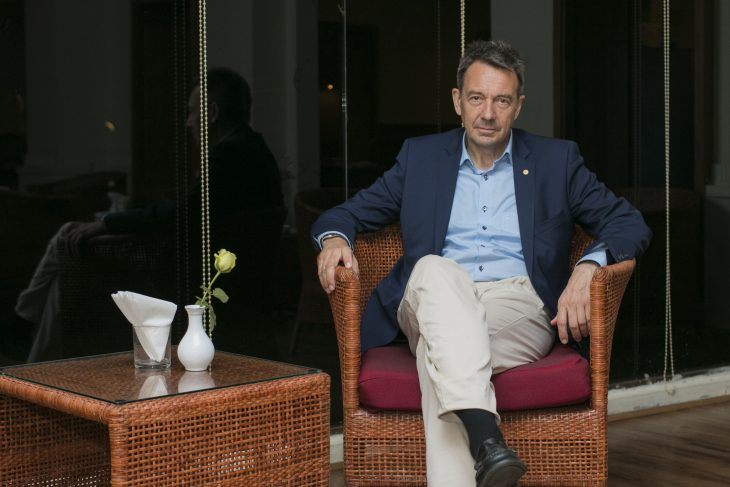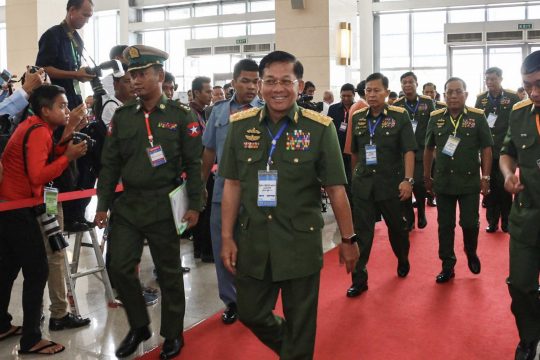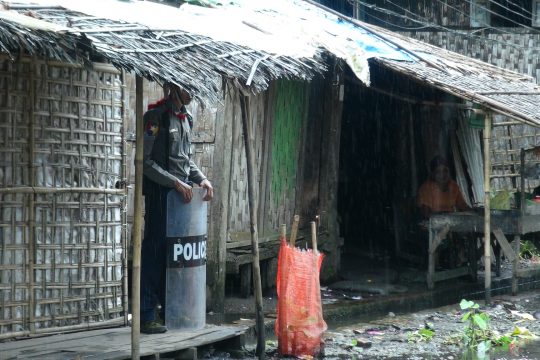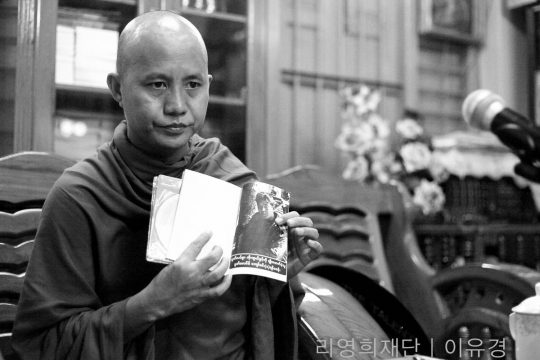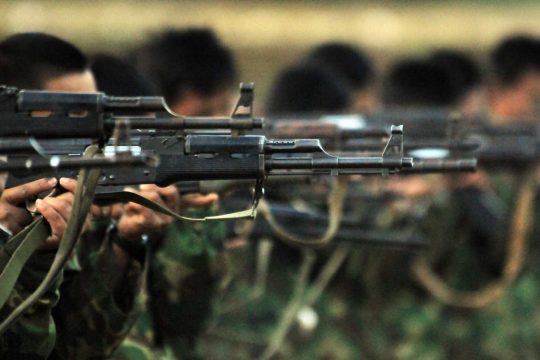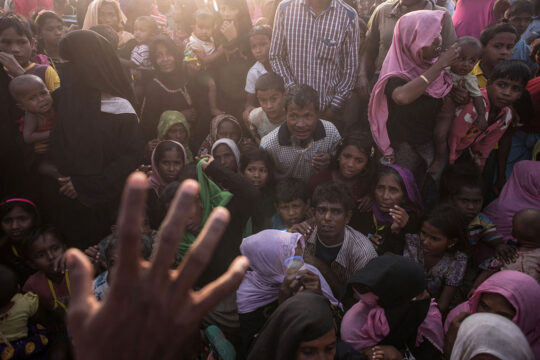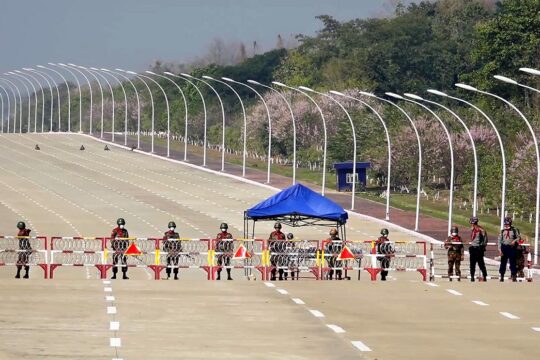The International Committee of the Red Cross works to provide relief to people within conflict zones. During a recent visit to tour ICRC projects and meet Myanmar officials, committee president Peter Maurer sat down for an interview with Frontier’s Jared Downing and reporters from several other outlets.
Your first visit to Myanmar was in 2013. What has been your biggest surprise, coming back this time?
From a relatively small operation of the ICRC, [ICRC Myanmar] has become the second largest in Asia, among the top 20 operations of ICRC worldwide. It has now a US$34 million budget, more than 500 people in the country, 10 offices.
This is good and bad news. When ICRC increases an operation, then obviously there are humanitarian needs, and humanitarian needs are an indication that there is a problem.
I flew in from [the Rakhine State capital] Sittwe today, and I have spent the last 24 hours in IDP camps, in communities, in poor villages, and it looks like two countries when you come to Yangon and you land here and you come to the middle of a booming city. So we just have to accept that this is a complex reality.
What surprised me at the end of the day is that some communities, which I visited four years ago and again yesterday, what you see is, of course, some positive impact of the work that humanitarian organisations do: water is distributed, food is channelled into camps, latrines and sanitation work is done in the camps, medical clinics are built up, medical transport is organised for patients from camps into hospitals.
And those positive developments are somehow countered by the fact that these camps are still there. People are afraid to go out of the camps, and people cannot go out the camps because of security restrictions … despite the fact that the events that led to the displacement are now more than almost five years back.
Former United Nations secretary-general Kofi Annan's commission has recommended that they begin closing these camps. Will you be giving a message when you go to Nay Pyi Taw to say, 'We think you should accelerate that process of closing these camps?'
We certainly believe, as many others, that the recommendations of the Annan report are very constructive … so I think it is important to take these recommendations seriously, to implement the recommendations at least in some of the critical areas of humanitarian work that we have mentioned.
And we in ICRC are certainly ready to see how far our knowledge on the ground … will allow us to be supportive of the implementation of those recommendations. But they, of course, have to be embraced, and eventually the details also have to be decided, by the government.
Regarding the ICRC prison-monitoring program, have you been able to access detainees involved in last year’s attacks in northern Rakhine?
In certain parts of the country we have problems accessing detainees, and this is definitely always a number one priority: to build trust with the respective authorities, to show them that we are not there to expose, but to rather confidentially work with them in order to improve the situation [of] detainees and respect international standards of detention.
So we are certainly continuing to work on that issue. We appreciate the accesses that we have already, and we have substantial accesses in detention facilities, but of course I mentioned it's not full everywhere and we are definitely working towards the situation. We are glad that we could resume detention activities in northern Rakhine [State] a couple of weeks ago, which were interrupted after the October events. And so we hope that in other parts of the country as well we will have full access.
The visit a few weeks ago that you mentioned, did ICRC visit the underage detainees that are being held separately?
Not yet.
Is that because access was denied?
[Other ICRC staff explain that it was not an access issue but a scheduling issue.]
But you are right to highlight: In all the visits there are timing and sequencing issues where the principle is basically clear, and we have to schedule the right moment. And then there are issues where we find ourselves with objections to visit during a certain period at a certain place. I was, beforehand, talking about those issues in particular with regard to Kachin [State], as well as Rakhine State.
The government and some of the armed groups that signed the nationwide ceasefire agreement have recently agreed to clear mines in Kayin State. How will the ICRC contribute to that?
We definitely agree with the fact that mines and unexploded ordinances are a big problem … so we are ready to engage as a humanitarian organisation wherever we can to build capacity to engage [in] mine clearance.
At the end of the day, the critical issue is to have the consensus [of] anybody who has put mines somewhere, to take those mines out of the place where they put them.
There is no other area where consensus is so critically important as mine action.
This is, again, a country which has seen an outrageous number of people with physical disability because of unexploded ordinances, and this is the reason why we scaled up considerably our physical rehabilitation work in the country with an important physical rehabilitation centre in [the Kachin State capital] Myitkyina.
The third pillar, besides helping with mine clearance and physical rehabilitation, is of course mine awareness advocacy, which ICRC has always played an important role.
To what extent can ICRC work with ethnic armed militias, whether through mine clearance or rehabilitation within local communities?
Our ambition is to have access to people in need, and in order to have access to people in need you have to be able to engage with those who bear arms and are in control of territory and people in need.
I think the willingness of my organisation to do that is unquestioned. The question is whether we have an ability to have those accesses from the government side and whether we have a willingness from the armed group side to engage with us, because we can't impose engagement.
And here I think in certain parts, in Shan, Kachin, Rakhine State, we do have those contacts, those abilities, the knowledge on certain issues. And [in other places], we don't … But there is no question that, conceptually, that is why we have been created, that's what the Geneva Conventions invite us to do: basically to engage with all arms bearers in order to assist and protect people in need.
So the picture in Myanmar is spotty.
Are you disappointed that access to certain areas hasn't improved as much as you had hoped under this new government?
We know that access is not just freely granted and up for grabs, because then we wouldn’t be needed and things would happen without us ... And of course, by principle I have to be unsatisfied, because the role of my organisation is to be unhappy for every limitation of access … And in that sense I would hope that my visit contributes to further enlarge our ability to operate in places where we are not yet operating.
In northern Rakhine, access that has been granted still has a lot of limitations. You have to be accompanied by security forces for example…
I don't think we are accompanied by security forces. ICRC is never accompanied by security forces.
So ICRC has free movement in northern Rakhine?
Our methodology … is to engage with everybody carrying a weapon in order to negotiate consensus … so that what we do is happening without armed protection because we have approvals from the government and we feel reasonably safe to go into some of the more contentious areas.
So again, the access issue is a delicate issue … I strongly believe that granting access to the ICRC work … is in the interest of the Myanmar government and also the armed forces because at the end of the day there is no more effective tool to ease tensions than to offer fluid procedures for access to humanitarian organisations like us. We'll work on that.
Daw Aung San Suu Kyi said her government should be given some time to solve the conflicts in Rakhine state. How long will it take to provide basic services to the Muslim communities in Rakhine state?
Everybody acknowledges that it needs time to solve the conflict … Everybody knows that this is enormously complex. It's obvious that tensions as I have witnessed them four years ago are still there, so you need time to solve the conflict.
I’m not [willing] to go into a timetable on how much time it needs, because there is no absolute threshold.
And on top of it you have displacements from tensions and conflict which exacerbate developmental issues and those two aspects work into each other. You have villages which have been poor villages before 2012, and they are still poor villages today. One of the dilemmas which we always [have] is, how can actors work on both levels?
And on the other hand, on top of those structural development issues, we have humanitarian complications which come from tension and conflict.
And I think it's wrong to play the one against the other, to say ‘We don’t need humanitarian [aid], we need long-term development and all problems will disappear.’ They won’t. It’s also wrong to say we have first to sort out humanitarian issues and development will come later.
Because people, very frankly … don’t care whether their needs are put into the category of ‘humanitarian assistance’ or ‘development assistance’. They have needs. They need a school, they need water, they need a clinic, they need security, and all that stuff is not delivered by one organisation, nor by a national government, nor by the civil society, nor by international actors. The question is, how we can make a better impact in intelligently working together?
My point to you is, what I consider the strength of the ICRC and the Red Cross movement, is that we engage in mutual and impartial humanitarian work. This is very often work which allows community to reconnect, to stabilise their lives and livelihoods, to basically make a first step which is of critical importance in order to have more meaningful stability.



